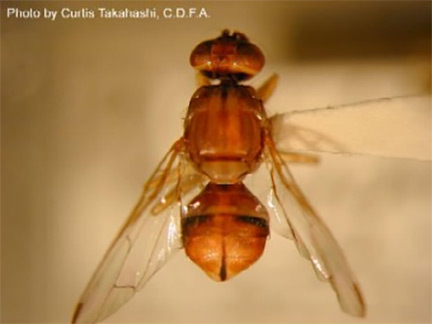Contra Costa County, CA – The Contra Costa County Agricultural Commissioner, in cooperation with the California Department of Food and Agriculture and the United States Department of Agriculture, are beginning an extensive survey in response to the detection of three peach fruit flies within the City of Brentwood and one peach fruit fly within the City of Oakley.
The peach fruit fly (PFF) detection’s occurred between July 31 and August 14, 2019. Treatment to eradicate the peach fruit fly that threatens crops and our natural environment will occur. Residents will be notified if their property is part of the effort. Currently, only three residences in the County are impacted.
The detections were made as part of our coordinated pest prevention system that protects our agriculture and natural resources from invasive species with early detection, a key component to successfully eradicate an infestation before it can become established.
The extensive survey consists of multiple peach fruit fly traps placed in concentric circles going out 4.5 miles in each direction from the peach fruit fly detection sites. Additional PFF detections may trigger a quarantine.
Following the principles of Integrated Pest Management (IPM), the California Department of Food and Agriculture uses “male attractant” technique as the mainstay of its eradication effort for this invasive species. This approach has successfully eliminated dozens of fruit fly infestations in California. Trained workers squirt a small patch of fruit fly attractant mixed with a very small dose of an organic pesticide, Spinosad, approximately 8-10 feet off the ground on street trees and similar surfaces; male fruit flies are attracted to the mixture and perish after consuming it. The male attractant treatment program is being carried out over several square miles surrounding the sites where the peach fruit flies were trapped.
The peach fruit fly is known to attack numerous types of fruits and vegetables. Important California crops at risk include apple, avocado, citrus, cucumber, dates, fig, guava, peach, pear, and tomato. Damage occurs when the female lays eggs in the fruit. These eggs hatch into maggots, which tunnel through the flesh of the fruit, making it unfit for consumption.
While fruit flies and other invasive species that threaten California’s crops and natural environment are sometimes detected in agricultural areas, the vast majority are found in urban and suburban communities. The most common pathway for these pests to enter the state is by “hitchhiking” in fruits and vegetables brought back illegally by travelers as they return from infested regions of the world or from packages of home grown produce sent to California. Help protect California’s agricultural and natural resources; please Don’t Pack a Pest (www.dontpackapest.com) when traveling or mailing packages.
Federal, state and county agricultural officials work year-round, 365 days a year, to prevent, deter, detect, and eliminate the threat of invasive species and diseases that can damage or destroy our agricultural products and natural environment. The efforts are aimed at keeping California’s natural environment and food supply plentiful, safe and pest-free.
For information from the California Department of Food and Agriculture regarding the Peach Fruit Fly (PFF) Notice of Treatment and a map of proposed areas of treatment, visit: www.cdfa.ca.gov/plant/pdep/treatment/treatment_maps.html#pff. Additional information may be found here: https://www.cdfa.ca.gov/plant/PDEP/treatment/peach_ff.html.
Residents with questions about the project may call the Contra Costa County Agricultural Commissioner’s Office at (925) 608-6600.


2 comments
Thank you to all of the the hard workers out there, protecting the agriculture of our great state!
Thank you to all of you who works hard to keep our agriculture protected in our city’s.
Comments are closed.